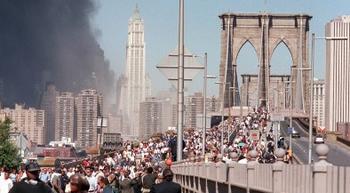submitted by Samuel Bendett
Homeland Security Newswire - September 12, 2011
 Most people still believe help will arrive within hours // Source: hsdl.org
Most people still believe help will arrive within hours // Source: hsdl.org
A new survey finds that most Americans are unprepared for major disasters and that they maintain a false sense of security with regard to what will happen if a major disaster or a terrorist attack took place; contrary to reality, almost one-third of respondents believed that during a major disaster, calling 911 would bring help within an hour, while 30 percent said they believed help would come within several hours.
A new survey finds that most Americans are unprepared and maintain a false sense of security during a major disaster or terrorist attack.
The poll, conducted by the National Center for Disaster Preparedness at Columbia’s Mailman School of Public Health, indicated that more than half of the families surveyed had no emergency plan in place for a major hurricane or earthquake. Even those with plans in place were lacking essential items like a flashlight, two days of food and water, key phone numbers, and extra batteries.
Recent Comments